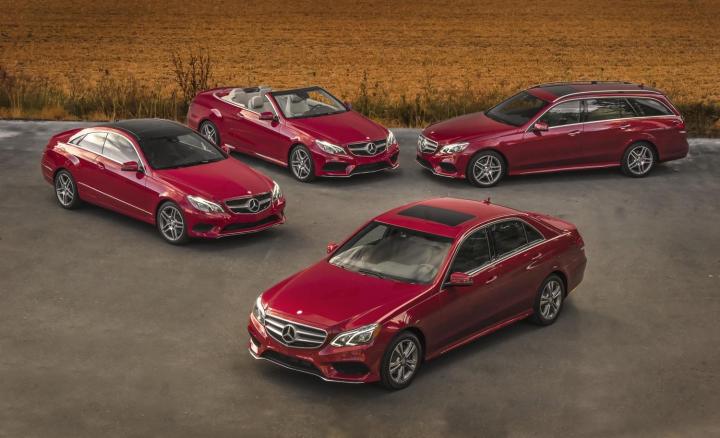
The 2017 Mercedes-Benz E-Class will feature a host of new tech, including some features that move Mercedes a step closer to the autonomous cars it has said it wants to put on sale by 2020. That includes systems that allow the E-Class to drive semi-autonomously in certain situations and maneuver in and out of parking spaces. This will also likely be the first factory deployment of a “Car-to-X communication” early warning system.
Mercedes says the new E-Class will be able to follow other cars at speeds up to 200 kph (124 mph), taking over all acceleration and braking duties as well as providing “steering assistance” to the driver. At speeds up to 130 kph (80 mph), the system does not necessarily need clear lane markings to operate.
A Speed Limit Pilot also features the ability to automatically adjust speed if it detects changes in the speed limit, either by reading road signs or noting speed zones programmed into the navigation system.
Other semi-automated features include Active Brake Assist, which can detect situations where emergency braking may be required, warn the driver, and provide everything from a brake-pressure boost up to full automatic braking. There’s also Evasive Steering Assist, which adjusts power-steering boost to help the driver execute evasive maneuvers.
When it’s time to park, Mercedes says the new Remote Parking Pilot will allow the driver to get out of the car and steer it into a parking space using a smartphone app. This lets occupants avoid having to get in and out in a tight space, and should make moving the car easier. This feature won’t be available in the U.S. at launch, though.
Mercedes has offered Car-to-X systems as a retrofit option in Europe since 2013, and will now place the technology in new cars beginning with the 2017 E-Class.
A variant of the vehicle-to-vehicle (V2V) systems that have received praise from U.S. safety regulators, Car-to-X allows vehicles equipped with the necessary hardware to transmit signals to each other, providing greater awareness of potentially dangerous road conditions.
This could potentially allow a driver to “see” obstacles that may be out of his or her field of view, or to get an advance warning of an impending accident, or of a traffic jam or bad weather farther ahead. Mercedes claims the system could also receive data from emergency vehicles if agencies choose to provide it, meaning drivers could be alerted to the presence of a fast-moving police car or ambulance before hearing sirens.
Of course, only cars equipped with the system can communicate with each other, so the benefit will likely be limited until a critical mass of “talking” cars is reached.
In addition to the safety-related tech, E-Class drivers will be able to ditch their key fobs and use smartphones as “digital keys,” using Near Field Communication with a sensor located near the driver’s door handle.
The 2017 Mercedes-Benz E-Class is expected to debut this coming auto show season, and will go on sale next year.
Editors' Recommendations
- Mercedes G580 electrifies an off-road icon
- 2024 Mercedes-AMG S63 E Performance first drive review: high-performance plug-in
- Mercedes-Benz GLC-Class takes a subtle approach to tech
- 2021 Mercedes-Benz S-Class first drive review: Titan of tech
- The best luxury cars

